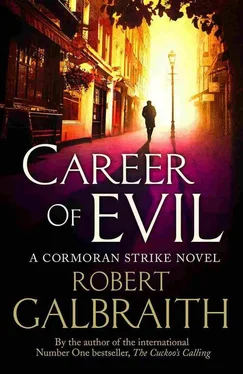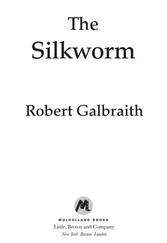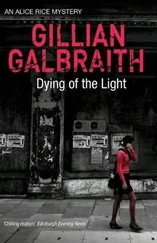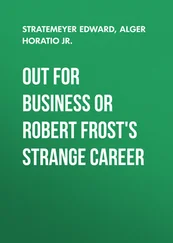“Evidence?” Strike said bluntly.
“Harringay Crime Syndicate’s been moving Eastern European prostitutes around London and up in Manchester. I’ve been talking to Vice. They bust into a brothel up the road last week and got two little Ukrainians out of there.” Wardle dropped his voice still lower. “We’ve got female officers debriefing them. They had a friend who thought she was coming to the UK for a modeling job and never took kindly to the work, even when they beat the crap out of her. Digger dragged her out of the house by her hair two weeks ago and they haven’t seen her since. They haven’t seen Digger since, either.”
“All in a day’s work for Digger,” said Strike. “That doesn’t mean it’s her leg. Has anyone ever heard him mention me?”
“Yes,” said Wardle triumphantly.
Strike lowered the pint he had been about to sip. He had not expected an affirmative answer.
“They have?”
“One of the girls Vice got out of the house is clear she heard Digger talking about you not long ago.”
“In what context?”
Wardle uttered a polysyllable: the surname of a wealthy Russian casino owner for whom Strike had indeed done some work at the end of the previous year. Strike frowned. As far as he could see, Digger knowing that he had worked for the casino owner made it no more likely that Digger had found out that he owed his previous stretch of incarceration to Strike’s evidence. All Strike took from this fresh information was that his Russian client moved in extremely insalubrious circles, something of which he had already been aware.
“And how does me taking Arzamastsev’s coin affect Digger?”
“Well, where d’you wanna start?” said Wardle, with what Strike felt was vagueness masquerading as the wide view. “The Syndicate’s got fingers in a lot of pies. Basically, we’ve got a guy you’ve crossed with a history of sending people body parts, and he disappears with a young girl right before you get sent a young girl’s leg.”
“You put it like that, it sounds convincing,” said Strike, who remained entirely unconvinced. “Have you done anything about looking at Laing, Brockbank and Whittaker?”
“Course,” said Wardle. “Got people trying to locate all of them.”
Strike hoped that was true, but refrained from questioning the statement on the basis that it would jeopardize his friendly relations with Wardle.
“We’ve got CCTV of the courier as well,” said Wardle.
“And?”
“Your colleague’s a good witness,” said Wardle. “It was a Honda. Fake plates. Clothes exactly as she described. He drove off south-west — heading towards a real courier depot, as it goes. Last time we caught him on camera was in Wimbledon. No sign of him or the bike since, but like I say, fake plates. Could be anywhere.”
“Fake plates,” repeated Strike. “He did a hell of a lot of planning.”
The pub was filling up all around them. Apparently the band was going to play upstairs: people were squeezing towards the door that led to the first floor and Strike could hear the familiar scream of microphone feedback.
“I’ve got something else for you,” said Strike, without enthusiasm. “I promised Robin I’d give you copies.”
He had returned to his office before daybreak that morning. The press had given up trying to catch him going in or out, though an acquaintance in the guitar shop opposite informed him that photographers had lingered until the previous evening.
Wardle took the two photocopied letters, looking mildly intrigued.
“They’ve both come in the last couple of months,” said Strike. “Robin thinks you should take a look. Want another?” he asked, gesturing to Wardle’s almost empty glass.
Wardle read the letters while Strike bought two more pints. He was still holding the note signed RL when he returned. Strike picked up the other one and read, in clearly legible, rounded schoolgirlish writing:
... that I will only be truly me and truly complete when my leg is gone. Nobody gets that it isn’t and never will be part of me. My need to be an amputee is very hard for my family to accept, they think it is all in my mind, but you understand...
You got that wrong, thought Strike, dropping the photocopy back onto the tabletop and noting as he did so that she had written her address in Shepherd’s Bush as clearly and neatly as possible, so that his reply, advising her on how best to cut off her leg, would be in no danger of going astray. It was signed Kelsey, but with no surname.
Wardle, still deep in the second letter, let out a snort of mingled amusement and disgust.
“Fucking hell, have you read this?”
“No,” said Strike.
More young people were squeezing into the bar. He and Wardle were not the only people in their midthirties, but they were definitely at the older end of the spectrum. He watched a pretty, pale young woman made up like a forties starlet, with narrow black eyebrows, crimson lipstick and powder-blue hair pinned into victory rolls, look around for her date. “Robin reads the nutter letters and gives me a précis if she thinks I need one.”
“‘I want to massage your stump,’” read Wardle aloud. “‘I want you to use me as a living crutch. I want—’ Holy shit. That’s not even physically—”
He flipped over the letter.
“‘RL.’ Can you read that address?”
“No,” said Strike, squinting at it. The handwriting was dense and extremely difficult to read. The only legible word in the cramped address, on a first read, was “Walthamstow.”
“What happened to ‘I’ll be by the bar,’ Eric?”
The young woman with the pale blue hair and crimson lips had appeared at the table beside them, holding a drink. She wore a leather jacket over what looked like a forties summer dress.
“Sorry, babes, talking shop,” said Wardle, unperturbed. “April, Cormoran Strike. My wife,” he added.
“Hi,” said Strike, extending a large hand. He would never have guessed Wardle’s wife looked like this. For reasons he was too tired to analyze, it made him like Wardle better.
“Oh, it’s you! ” said April, beaming at Strike while Wardle slid the photocopied letters off the table, folded and pocketed them. “Cormoran Strike! I’ve heard loads about you . Are you staying for the band?”
“I doubt it,” said Strike, though not unpleasantly. She was very pretty.
April seemed reluctant to let him go. They had friends joining them, she told him, and sure enough, within a few minutes of her arrival another six people turned up. There were two unattached women in the group. Strike allowed himself to be talked into moving upstairs with them, where there was a small stage and an already packed room. In response to his questions, April revealed that she was a stylist who had been working on a magazine shoot that very day, and — she said it casually — a part-time burlesque dancer.
“Burlesque?” repeated Strike at the top of his voice, as microphone feedback again screeched through the upper room, to shouts and groans of protest from the assembled drinkers. Isn’t that arty stripping? he wondered, as April shared the information that her friend Coco — a girl with tomato-red hair who smiled at him and wiggled her fingers — was a burlesque dancer too.
They seemed a friendly group and none of the men were treating him with that tiresome chippiness that Matthew exhibited every time he came within Strike’s orbit. He had not watched any live music in a long time. Petite Coco had already expressed a desire to be lifted up so she could see...
However, when the Islington Boys’ Club took to the stage Strike found himself forcibly transported back to times and people he strove not to think about. Stale sweat in the air, the familiar sound of guitars being tweaked and tuned, the humming of the open mic: he could have borne them all, had the lead singer’s posture and his lithe androgyny not recalled Whittaker.
Читать дальше











